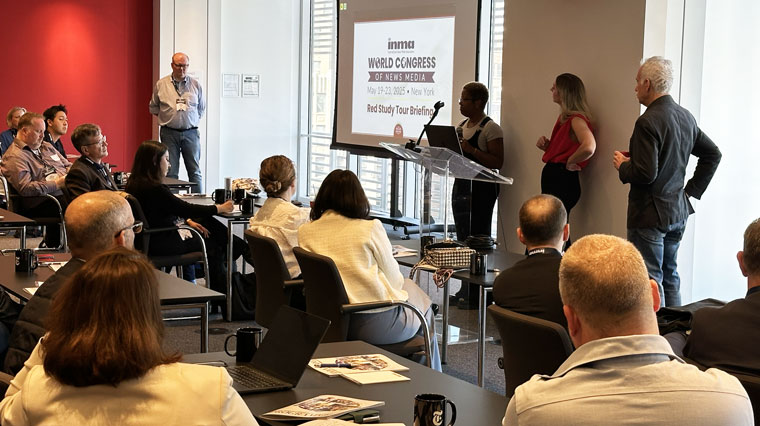AI efficiency with a human touch, building trust are key themes of New York study tours
World Congress Blog | 28 May 2025
Leveraging AI for efficiency without losing the unique value of human journalism and building audience trust while navigating technological and societal upheavals were the underlying themes from INMA study tour visits with 13 media companies last week in New York.
Some 83 media professionals across two study tours fanned out across Manhattan by foot and bus on the first two days of INMA World Congress of News Media last week. In total, the study tours featured 32 hours of visits with top executives, while participants got a unique flavour for New York offices and stellar views of Manhattan.

INMA visited The New York Times, Wall Street Journal, Gannett | USA Today Network, Dotdash Meredith, Condé Nast, Advance Local, Scientific American, BBC, Business Insider/Axel Springer, Yahoo News, Newsweek, Financial Times, and Reuters. The New York-based media companies represented elite global news brands, local U.S. media groups, magazine media, digital natives, broadcasters, and a healthy dose of U.K. companies expanding into the United States.
INMA’s premium study tours remain the gold standard in the news industry, with the two New York tours representing the third and fourth out of seven INMA tours for 2025. INMA conducted a subscription study tour in Amsterdam in March and a tech innovation study tour in Bengaluru in April. Remaining study tours this year will be in Mumbai, Dublin, and Silicon Valley.
INMA Researcher-in-Residence Greg Piechota and INMA Newsroom Transformation Initiative Lead Amalie Nash led the two study tours.
Distilling across all visits, common themes of the New York study tours included:
AI as a core enabler: AI is transforming workflows, content production, and audience engagement across nearly every company visited. From Reuters’ AI tools for news alerts and summaries, to The Guardian’s audience analytics, to Business Insider’s editorial efficiencies, AI is seen as essential — but not a replacement — for human judgment. The human touch remains critical for differentiation.

The human element as differentiator: In a world where everyone has access to AI, standing out means emphasising creativity, editorial voice, and trust. This includes fairness meters (Newsweek), audience feedback loops (The Guardian, Financial Times), and personalised experiences (Yahoo News, The Atlantic).

Product diversification and bundling: Media companies are expanding beyond core news products — into games (New York Times, Gannett), commerce (Condé Nast), and live blogs (FT) — to deepen engagement and open new revenue streams. It’s about being part of people’s daily lives, not just their news diet.
Audience-first mindset: Successful companies are laser-focused on audience insights, engagement metrics, and tailoring experiences (BBC, Advance Local, Financial Times). Data drives decisions, from content creation to product development.
Trust, transparency, and values: Building trust in an era of polarisation and misinformation is a central concern. Newsweek’s fairness meters, The Guardian’s political voice, and Scientific American’s commitment to expertise reflect this. Companies recognise that how they report is as important as what they report.

Continuous experimentation: Every publisher is in a state of perpetual testing — new formats, audience feedback loops, AI integration, and business models. As Scientific American’s Kim Lau said, “You’re never done.”

Cutting across the 13 New York study tour stops, the most impactful insights were:
AI is table stakes, but it’s not the differentiator: As INMA researcher-in-residence Greg Piechota put it: "What if everyone has 20,000 journalists with AI?" The question isn’t how to use AI, but how to stand out when everyone has access to the same tools. Differentiation will come from editorial judgment, creativity, trust, and audience focus.
Trust is the news industry’s currency: Newsweek’s fairness and trust meters showed a tangible way to rebuild reader confidence, while The Guardian’s 40% U.S. growth underscores that taking a stand (and not “both-sides-ing”) resonates with audiences. Without trust, no Pulitzer Prize matters.

Audience data must drive strategy: From BBC’s audience insights shaping editorial to The Guardian’s political timing, the tour revealed that listening to readers— in real time — is essential for product development, content, and growth. Data is the roadmap, not just a dashboard.
Diversification is survival: Whether it’s puzzles at The New York Times and Gannett, commerce at Condé Nast, or live blogs at FT, the message is clear: News brands must offer more than news. People come for headlines but stay for services, community, and experiences.

Continuous experimentation is the new normal: What worked last year won’t work this year. Scientific American’s transformation journey, The Atlantic’s Labs, and Dotdash Meredith’s AI+publisher model all reinforce this: You can’t “finish” transformation. You adapt, test, iterate — and repeat.
AI’s greatest challenge is cultural, not technical: Reuters’ insight summed it up: The tech is doable. The culture is hard. Adoption of AI tools demands buy-in, training, and trust across newsrooms. It’s not just about having the tools but ensuring they’re embedded in daily workflows without eroding journalistic standards.

The human element is irreplaceable: Yahoo News, Business Insider, and Dotdash Meredith all emphasised: AI can supercharge efficiency, but the human touch — judgment, empathy, creativity — remains the ultimate value proposition for journalism.
In short, the INMA New York study tour stops revealed that AI enables, audiences guide, human trust differentiates, and news companies must diversify, experiment, and lead with purpose to thrive.





























